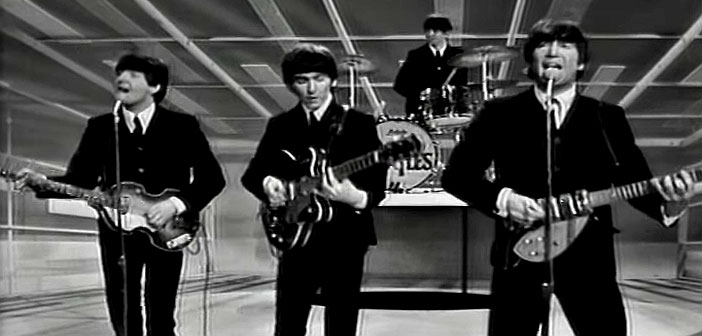Did the Beatles give a glimpse of a future society where the artist will be fully integrated into the life of the community?
Many of the claims that I made last week for the Crystals in US popular music can be made for the Beatles in England. They were at the beginning of the group vogue in Britain, and though John, George, Paul and Ringo are familiar names, they are Beatles first and individuals second. Their art is orientated towards identification, referring to familiar moods and experiences— the desires of youth (‘Please Please Me’, ‘Love Me Do”); sadness (Misery’); joy at a successful relationship (‘ThankYou Girl”); the pleasures of the dance-hall (Twist and Shout’). Moreover the Beatles evoke emotion with a subtlety that is rare among popular singers; the repetition, with change of pace, of the final line of ‘She Loves You’ —‘With a love like that you know you should be glad’, contains an intimate mingling of joy and melancholy that recalls the work of Musset or Heine.Interviewer: I believe Mr. Edward Heath has said that he finds difficulty in recognising the words you sing as the Queen’s English.
Beatle: We won’t vote for him then.
– Radio Newsreel, 16 October 1963
But there are other significant features about the popularity of Merseybeat in general and the Beatles in particular. The Beatles’ vigorous assertion of their Englishness and regionalism has come at the same time as a sharp decline in the popularity of American music. The Тор Twenty of 8 September this year contained only two American records. This ‘anti-Americanism’ is not I think, in any way akin to the crude nationalism of race thugs or anti-Common-Marketeers. Good American records still make the charts easily enough—and American popular music is still technically superior to British.
But the atmosphere of exoticism and hero-worship that used to surround American singers has been transcended and replaced by a greater integration between artist and audience.
The Beatles were not suddenly presented to a passive audience by an impresario through the impersonal media of radio, records and television. They began as a semiprofessional group as long ago as 1956, and slowly built up a considerable regional reputation before achieving national fame. I am told by a native of Merseyside that the proliferation of groups there is such that literally everybody has at least one personal acquaintance who performs in a group. This gives a glimpse of the possibility of a future society where the artist will be fully integrated into the life of the community, and no longer an isolated rebel. For rebellion and reformism are two sides of the same thing; both are dependent on an alien power which they make demands on or protest against. The Beatles embody an affirmation of self-sufficiency foreshadowing the day when ordinary people are completely autonomous.
It will be objected that I give too much importance to Merseybeat, and that it is only a transient fashion. Many of the groups will probably disappear from sight in the next twelve months (though each ‘well-informed’ statement that Merseybeat is finished is followed by the entry of yet another Mersey group to the charts). But the Beatles have the ability to survive—their greatest need is to broaden their range. They have not yet attempted anything as unorthodox as Gerry and the Pacemakers’ ‘You’ll never walk alone’, but their treatment of ‘A Taste of Honey’ shows their potentialities.
Ian Birchall, ISIS 13 November 1963. Ian wrote this article for Oxford University student magazine Isis, which was founded in 1892, long before the name was used by the extreme Jihadist group of recent years.

